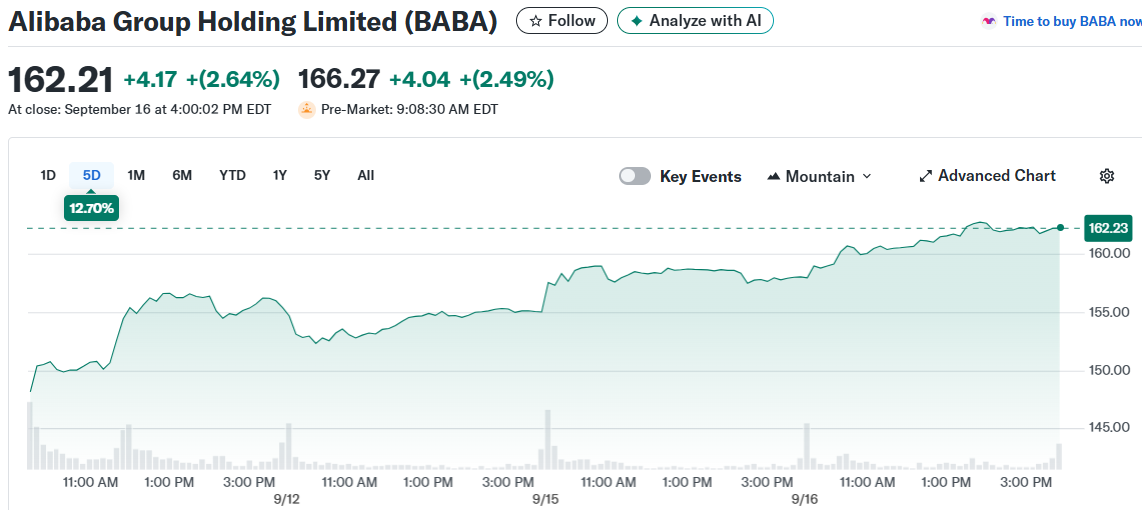TLDR
- Alibaba stock surged after China Unicom selected its Pingtouge AI chips for new data center deployment
- Jack Ma has returned to company operations after five years away, influencing key strategic decisions
- China advances semiconductor independence with SMIC testing first domestic lithography machine
- BABA shares up 91% year-to-date as cloud business posts 26% quarterly growth
- Company commits $53.5 billion to AI infrastructure over three years
Alibaba Group stock climbed in premarket trading Wednesday following news that China Unicom will deploy the company’s Pingtouge AI chips in a major northwestern data center. The deal marks a victory for China’s push toward technology self-reliance.
The state-owned telecom giant will install Alibaba’s T-Head processors alongside chips from MetaX and Biren Technology. China Unicom’s selection of domestic alternatives over restricted U.S. technology represents growing adoption of homegrown solutions.
Bloomberg reported that Alibaba Cloud has already delivered tens of thousands of AI chips to Unicom facilities. The partnership comes as American export restrictions block Chinese companies from accessing Nvidia’s most advanced accelerators.
Alibaba has pledged 380 billion yuan ($53.5 billion) over three years for AI infrastructure expansion. This investment supports Beijing’s broader strategy to reduce dependence on foreign technology suppliers.
Jack Ma’s Quiet Comeback
Jack Ma has quietly returned to Alibaba’s offices with greater involvement than seen since 2019. The founder influenced the company’s decision to spend 50 billion yuan on subsidies to compete with rival JD.com.
Ma holds no formal position but receives daily briefings on cloud computing, chip development, and AI projects. His return suggests renewed government support for China’s tech sector leaders.
The billionaire stepped back after criticizing Chinese financial regulators in 2020. Authorities subsequently blocked Ant Group’s IPO and launched a broader tech sector crackdown that erased nearly $700 billion from Alibaba’s market value.
Group Chairman Joe Tsai and CEO Eddie Wu officially lead operations. Wu oversees the artificial intelligence push backed by a $57 billion three-year investment plan.
China’s Semiconductor Independence Drive
China’s quest for chip self-sufficiency advanced as SMIC began testing the country’s first domestically produced advanced lithography machine. The Financial Times reported that Semiconductor Manufacturing International Corp. started trials of equipment developed by Shanghai startup Yuliangsheng.
Chinese chipmakers have historically relied on ASML’s lithography systems, most acquired before export restrictions took effect. The Netherlands continues blocking ASML’s extreme ultraviolet tool shipments to China.
SMIC engineers are testing 28-nanometer equipment using multi-patterning techniques to achieve 7-nm production. Industry sources suggest yields could extend to 5-nm capabilities.
Beijing targets tripling domestic chip output by 2026 using stockpiled foreign equipment. Homegrown machines should contribute meaningfully by 2027.

Alibaba’s stock has surged 91% year-to-date, surpassing its 52-week high of $163. The company’s cloud division grew 26% in the latest quarter, its fastest expansion in years.
Current market capitalization stands at $380 billion, roughly half the company’s peak valuation before regulatory action. BABA shares traded 2.34% higher at $166.01 in Wednesday premarket activity.





